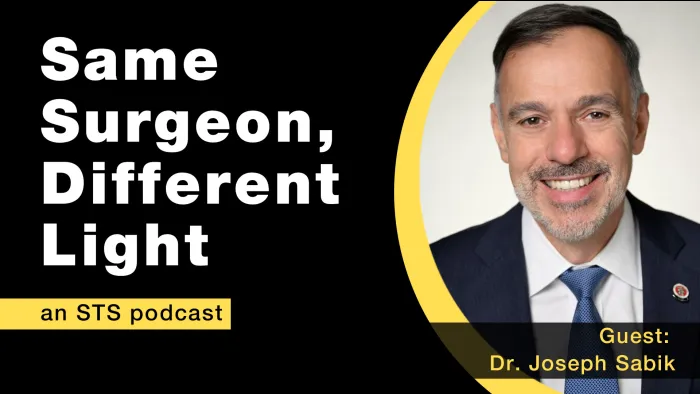The Nina Starr Braunwald Extraordinary Women in Cardiothoracic Surgery Award, presented at the STS Annual Meeting each year, honors the remarkable women who have shaped, challenged, and pioneered our specialty. This year, we’re also recognizing the people that support them.
Co-sponsored by The Society of Thoracic Surgeons (STS) and Women in Thoracic Surgery (WTS), this distinction pays tribute to excellence in clinical care, academic achievement, mentorship, leadership, and resilience—and in doing so, opens doors for future generations. STS talked with three of the past Extraordinary Women in Cardiothoracic Surgery to discuss what this honor means to them.
Reflections from Past Honorees
For 2025 award recipient Jessica Donington, MD, the connection to Dr. Braunwald is deeply personal. “Any time your name is placed in association with that of Nina Starr Braunwald, it is an incredible honor that takes my breath away,” said Dr. Donington.
She emphasized the award’s broader significance, recognizing not only surgical achievement, but the lasting impact of mentorship and leadership. “This award speaks to the impact women can create in CT surgery, not just through technical skill, but through the lives they influence.”
Dr. Donington also reflected on the Nina Starr Braunwald Extraordinary Women in Cardiothoracic Surgery ceremony and breakfast, where she received the award, describing it as a “meaningful, understated tribute.” She especially values that the ceremony is held on the opening day of the STS Annual Meeting, underscoring the significance of the occasion.
As part of the recognition, honorees also receive a monthly delivery of flowers in a commemorative vase, which Dr. Donington calls “a simple but elegant gesture that “serves as a daily reminder of my journey.” She added, “These touches reflect the spirit of the award: to celebrate excellence in a way that is both inspiring and deeply human.”
Ayo Saito, MD, also a 2025 recipient, highlighted the award’s cultural importance. “This award demonstrates the society’s commitment to educating and encouraging female surgeons. That kind of moral support is essential for many of my colleagues today.”
Reflecting on the personal impact of receiving the award, Dr. Saito said,” “It helped me show my mother what I’ve truly achieved. Until then, she had seen only the exhaustion and sacrifice and had hoped I might choose a ‘normal life’ as a ‘normal woman.’ Now, she understands that this level of dedication is not only recognized — but deeply valued.”
Dr. Saito also talked about the Extraordinary Women in Cardiothoracic Surgery Award’s impact on the global community. “This initiative not only shares our progress as women surgeons but also inspires future generations of women in Japan and beyond. While our society may not yet fully grasp the significance of such recognition, I believe that, with continued effort, we will see meaningful change.”
Stephanie Fuller, MD, another distinguished 2025 honoree, reflected on the broader implications of the award and its role in driving equity forward. “We still struggle to achieve equality as women. There remains a significant bottleneck to attaining leadership positions and being recognized for technical ability. This award promotes visibility and recognition for women who accomplish extraordinary things despite these obstacles. It is also essential to thank and recognize the men who nominate and support us along the way.”
Dr. Fuller shared a memory associated with the award that speaks to the power of peer support. “I was touched to receive the phone call informing me that I was a recipient. However, my favorite memory comes from the year before, when I was nominated by one of my cardiology colleagues,” said Dr. Fuller. “Yes, you can be nominated by your colleagues outside of surgery. He reached out with a letter of support, and although I didn’t receive the award that year, I felt truly seen by my peers.”
Reflected on the alignment between this year’s STS Annual Meeting theme, Teaching for Tomorrow Together, and the award’s mission, Dr. Fuller said, “This award embodies inclusion. The premise that everyone has something valuable to offer is prominent. Our field is evolving into a diverse and talented community, regardless of age, sex, race, religion, or ethnicity. We are stronger when we learn from one another, and the camaraderie gets us through even the toughest days.”
Other previous Extraordinary Women in CT Surgery Award winners include Drs. Leah Backhus, Jennifer Ellis, Betty Tong, Shanda Blackmon, Andrea Carpenter, and Jane Schwabe.
As we look ahead to the upcoming STS 62nd Annual Meeting, STS encourages you to nominate a peer, mentor, or colleague whose contributions embody the legacy of Dr. Nina Starr Braunwald and whose passion, perseverance, and impact deserve this recognition. By participating, you will not only honor your colleague but also help inspire the next generation and strengthen the community of surgeons who continue to break barriers. Learn more.
